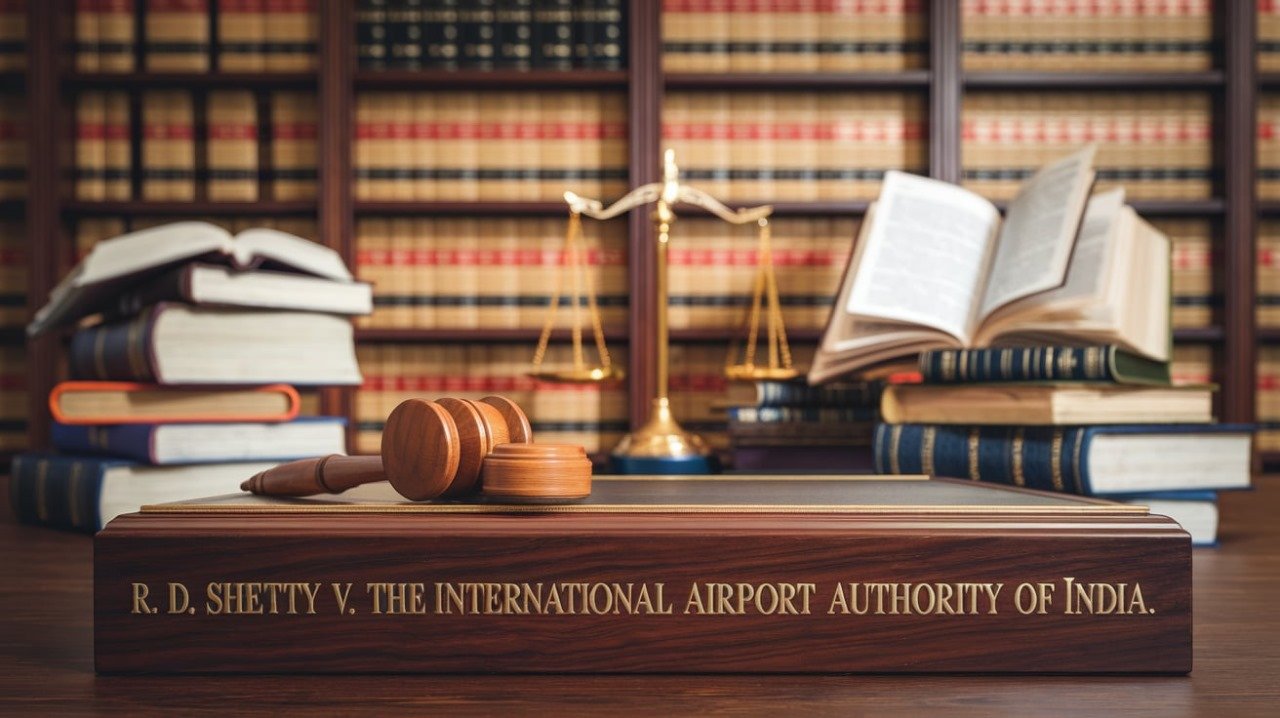R D Shetty V. The International Airport Authority Of India (Case Summary)

In this landmark ruling, the Hon’ble Supreme Court of India broadened the definition of “State” under Article 12 of the Constitution, holding that statutory bodies are considered as instrumentalities of the State, and are thus subject to constitutional obligations.
Table of Contents
ToggleFacts of Ramana Dayaram Shetty V. The International Airport Authority Of India
- The International Airport Authority of India, a statutory body, invited tenders for a restaurant and snack bars at Bombay Airport.
- The notice specified that only “registered IInd Class Hoteliers having at least 5 years experience” could submit tenders.
- The fourth respondents, who did not meet the five-year experience requirement, submitted the only complete tender and were awarded the contract. The International Airport Authority of India (IAAI) found their catering experience satisfactory.
- The appellant (R.D. Shetty) challenged the decision in the Bombay High Court by filing a writ petition, arguing that he would have submitted a tender had he known the experience requirement would not be enforced.
- He contended that the IAAI, as a state authority, acted arbitrarily and violated the equality clause of the Constitution by accepting a tender that didn’t meet the stated criteria, denying him equal opportunity.
Issues framed
- Whether the International Airport Authority of India, a statutory body, could be considered an “instrumentality” or “agency” of the State under Article 12 of the Indian Constitution, hence it is maintainable or not?
- Whether the International Airport Authority of India (IAAI) violated Article 14 by accepting the tender of the fourth respondents without the required experience, thereby engaging in discriminatory and arbitrary practices?
Judgment of Ramana Dayaram Shetty V. The International Airport Authority Of India
The Court’s analysis focused on interpreting Article 12 of the Constitution, which defines “State” to include various entities such as the government and its instrumentalities. The key question was whether a body created by statute, could be classified as a “State” under this Article. It also analyzed Article 14, which prohibits arbitrary state action and ensures equality before the law.
The Court meticulously assessed the characteristics of the IAAI based on established criteria for identifying a “government instrumentality or agency.” The Court found that:
- Financial Dependence: The IAAI relied heavily on the Central Government for capital, including all its non-recurring expenditures, and was required to submit annual financial estimates for government approval.
- Government Control: The Central Government exercised significant control over the IAAI, including the power to appoint and dismiss its Chairman and members, and to issue binding directives on policy matters.
- Public Function: The IAAI managed functions that were previously performed directly by the Central Government, such as airport administration and air navigation services, emphasizing its public character.
- Public Servants: Employees of the IAAI were classified as “public servants” under the International Airport Authority Act of 1971, further reinforcing the connection to governmental duties.
In the case of Ramana Dayaram Shetty v. The International Airport Authority of India, considering the cumulative effects of these factors, the Court concluded that a statutory authority, like the International Airport Authority of India (IAAI), falls under the purview of Article 12 of the Indian Constitution. The court also found that the IAAI had acted arbitrarily and discriminated by deviating from its tender’s eligibility criteria, violating Article 14’s guarantee of equal treatment. The IAAI’s acceptance of a tender from a party that did not meet the required experience was deemed unlawful, as it unfairly excluded other potential tenderers. Despite these findings, the court exercised its discretion not to void the contract, citing the appellant’s delayed filing and questionable motives. The judgment reinforced that statutory corporations like the IAAI must uphold constitutional and administrative law standards, ensuring fairness and preventing arbitrary action. The Court, further, established guidelines for classifying a corporation or entity as a “State” under Article 12, considering the following factors:
- Whether the Government Owns the Entire Share Capital: If the entire share capital is held by the government, it indicates the corporation is an instrumentality or agency of the government.
- Whether the Financial Assistance from the State is Substantial: If state financial assistance covers almost the entire expenditure, it suggests the corporation has a governmental character.
- Whether the Corporation Enjoys Monopoly Status: If the corporation enjoys monopoly status conferred or protected by the state, it may indicate it is an instrumentality or agency of the government.
- Whether There is Deep and Pervasive State Control: The existence of deep and pervasive state control indicates the corporation is a state agency or instrumentality.
- Whether the Functions are of Public Importance: If the corporation’s functions are of public importance and closely related to governmental functions, it supports classification as an instrumentality or agency of the government.
- Whether a Government Department has been Transferred: If a government department is transferred to a corporation, it strongly supports the inference that the corporation is an instrumentality or agency of the government.